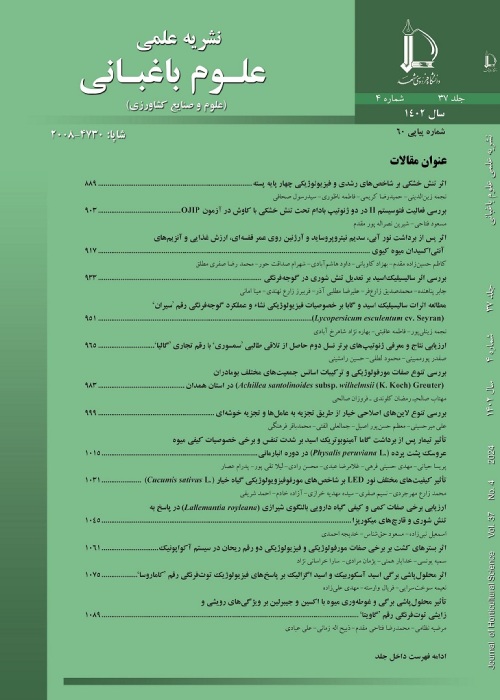Effect of Gibberellic Acid under Deficit Irrigation on Physicochemical and Shelf Life Attributes of Pomegranate Fruit (cv. Shahvar)
Author(s):
Abstract:
Introduction
Pomegranate (Punica granatum L.) belonging to the family Punicaceae, native to subtropical regions of Iran and adapted to arid or semi arid climates with mild winters. Pomegranate is fairly drought tolerant but requires regular irrigation to produce high yield and fruit weight. Large parts of Iran within the boundaries of central deserts (Dasht-e-kavir and Kavir-e-Loot) have arid or semi-arid conditions which make them suitable for pomegranate production. However drought crisis and water resources restriction are very serious in these areas.Materials And Methods
This experiment was conducted on 7-year old pomegranate cv. Shahvar trees from 2013 to 2014 in Torbat-e-Heydarieh, Razavi Khorasan, Iran. Irrigation treatments and Gibberellic acid application were used in Completely Randomized Split-Plot Design with four replications. Irrigation treatments included [1-control: 100% of estimated crop evapotranspiration (Etc) 2-Sustained deficit irrigation (SDI): watering was constantly used at 50%Etc, and 3-Regulated deficit irrigation (RDI): not watering was imposed until fruit set and then irrigation was applied same as control]. Foliar application of Gibberellic acid was done with two concentrations (0 and 150 ppm) at early May and September. Precipitation and pan evaporation (Ep) was recorded by weather station that located at 15 km distance from the studied orchard. Daily crop reference evapotranspiration (ETo) was estimated by penman-monteith equation. Trees were drip-irrigated by two lateral lines parallel to the tree row and four emitters that each one delivers 4 liters per hour. Fruit weight and numbers, tree production (yield), peel, arils and juice percent and finally fruit cracking of each treatment were determined at ordinary harvest time in late of October. Some uniform and intact fruits per treatment transferred to cold storage (T= 5 ◦C, RH= 85-90%). After storage period the fruits transfered to shelf life condition (7 days at 20 ◦C and RH= 65-70%) to evaluate physiochemical traits at 2 different storage periods (9 and 18 weeks). Weight loss and chilling index were determined during 3 weeks intervals of storage. Weight loss was evaluated by a gravimetric method and results were expressed as percent of initial fresh weight. Chilling index was quantified by 5 point scale of fruit husk injury: (1: without disorder, 2: slight disorder signs 3: moderate signs 4: severe signs and 5: unmarketable).Results And Discussion
In present research the effects of deficit irrigation treatments on all the measured attributes was significant at harvest time (p≤ 0.01). But Gibberellic acid spray had significant effect only on Fruit weight, juice percent and fruit cracking disorder. Likewise, deficit irrigation and Gibberellic acid interaction showed significant difference for fruit weight and cracking disorder. The results indicated that fruit weight, total yield and fruit juice in regulated deficit irrigation increased by 39.6, 17.1 and 16.6 percent in compare with control, respectively. Fruit numbers in control trees (108.3) was more than sustained (93.6) and regulated (87) deficit irrigation. It is possible that sustained (SDI) and regulated (RDI) deficit irrigation have decreased sprouting growth and consequently second or third waves of pomegranate flowers that forming on these shoots was lower by water restricting. Pomegranate peel percent in studied deficit irrigation strategies were less than control and naturally aril percent was more in these treatments. In other hand, the highest fruit cracking (9.1%) and lowest fruit weight (205.8 g) occurred in sustained deficit irrigation. However Gibberellic acid application could increase fruit weight and alleviate cracking disorder. The results of cold storage experiment showed that maturity index, antioxidant activity, total anthocyanin and chilling index improved by Sustained deficit irrigation. Variations of ripening index during cold storage occurred because of sugar conversion, not the changes of organic acids content. Indeed, rate of starch degradation to simple carbohydrates in fruits increase under drought condition. Probability drought in deficit irrigation treatments as an oxidative stress motivates antioxidant system and consequently increases chilling resistance in pomegranate fruits. Preharvest Gibberellic acid application amended weight loss and increased total anthocyanin and antioxidant activity during cold storage.Conclusions
On the base of this study it seems that using of some deficit irrigation strategies have acceptable consequences on pomegranate fruit production at conditions of water resources restriction. Likewise Gibberellic acid application on trees that were subjected by deficit irrigations ameliorates the adverse effects of drought stress.Keywords:
Language:
Persian
Published:
Journal of horticulture science, Volume:30 Issue: 2, 2016
Pages:
348 to 357
magiran.com/p1607237
دانلود و مطالعه متن این مقاله با یکی از روشهای زیر امکان پذیر است:
اشتراک شخصی
با عضویت و پرداخت آنلاین حق اشتراک یکساله به مبلغ 1,390,000ريال میتوانید 70 عنوان مطلب دانلود کنید!
اشتراک سازمانی
به کتابخانه دانشگاه یا محل کار خود پیشنهاد کنید تا اشتراک سازمانی این پایگاه را برای دسترسی نامحدود همه کاربران به متن مطالب تهیه نمایند!
توجه!
- حق عضویت دریافتی صرف حمایت از نشریات عضو و نگهداری، تکمیل و توسعه مگیران میشود.
- پرداخت حق اشتراک و دانلود مقالات اجازه بازنشر آن در سایر رسانههای چاپی و دیجیتال را به کاربر نمیدهد.
In order to view content subscription is required
Personal subscription
Subscribe magiran.com for 70 € euros via PayPal and download 70 articles during a year.
Organization subscription
Please contact us to subscribe your university or library for unlimited access!


